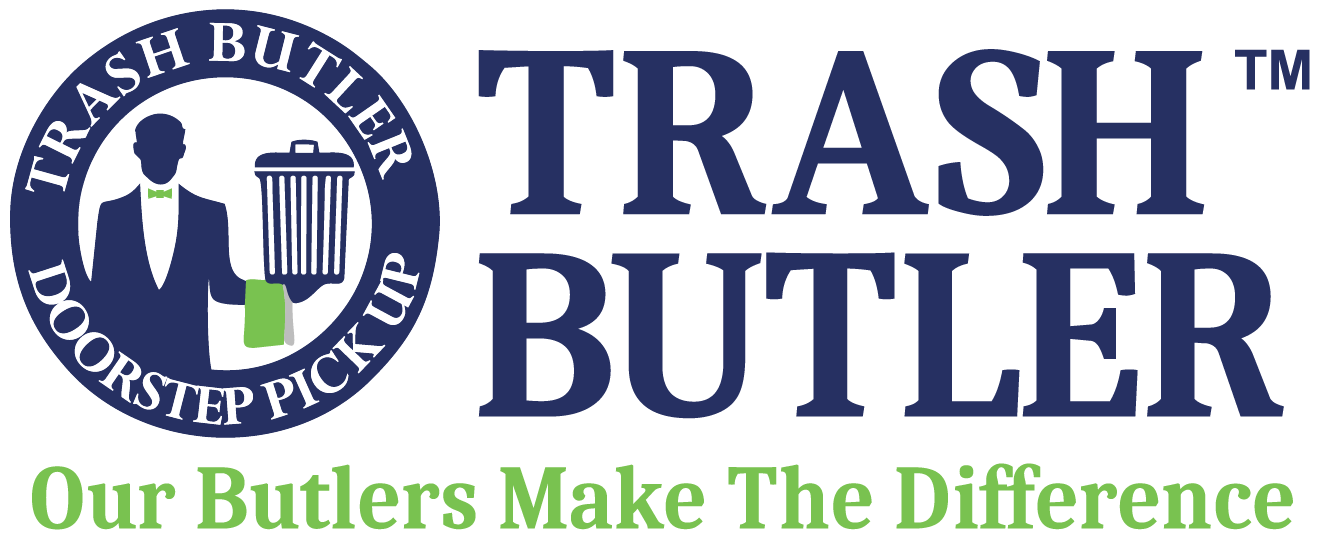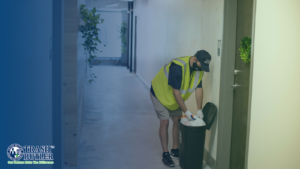Key Takeaways:
- Benefits of Effective Apartment Waste Management: Effective apartment waste management enhances property aesthetics, boosts resident satisfaction with convenient services like Trash Butler™, and demonstrates environmental responsibility through recycling and cost savings.
- Challenges of Apartment Waste Management include Addressing space constraints, managing high volumes and diverse types of waste, promoting resident compliance, and minimizing environmental impact to meet regulatory standards.
- Implementing the 3 R’s: Focus on Reducing waste through minimalist living and digital solutions, Reusing materials via donation drives and swap events, and Recycling effectively with comprehensive facilities and educational programs.
Property management is a constant juggling act, requiring a balance between tenant needs, maintenance issues, and budget constraints. However, dealing with overflowing dumpsters and waste management frustrations shouldn’t add to your burden.
As urban populations grow, efficiently managing waste becomes increasingly crucial. Implementing robust waste management strategies is essential to keeping communities livable, attractive, and compliant with local regulations.
This article provides essential waste management tips for property managers. These tips are designed to streamline operations, improve residents’ quality of life, and ensure regulatory compliance.
What Is Apartment Waste Apartment Waste Management?
Apartment waste management is the systematic approach to handling waste generated within apartment communities. This includes collecting, transporting, processing, recycling, and disposing of waste materials managed by property managers or contracted third-party services like Trash Butler™. Effective waste management practices are crucial for keeping the property clean and livable, promoting environmental sustainability, and reducing a community’s overall ecological footprint.
For multi-family apartment communities, where the density of residents is high, the challenges of efficiently managing waste are significant. Implementing a structured waste management strategy ensures that all types of management align with regulations and meet residents’ needs and expectations.
It ultimately reflects the community’s commitment to maintaining a clean and healthy living environment. This responsibility often encompasses a variety of tasks, including scheduling regular waste pickup, facilitating proper waste segregation, and educating residents about sustainable waste practices.
Benefits Of Effective Apartment Waste Manager
Implementing effective apartment waste management strategies offers numerous benefits for multi-family apartment communities, enhancing the environmental footprint and residents’ living experience. Here are the key advantages:
Improved Property Aesthetics
A well-managed waste system keeps communal areas clean and debris-free, enhancing the property’s overall look and boosting its curb appeal. This can be particularly important for attracting new tenants and satisfying current residents, contributing positively to the community’s reputation.
Increased Resident Satisfaction
Effective waste management directly impacts resident satisfaction. Services like Trash Butler™, which provide doorstep valet trash service, add a layer of convenience and luxury, highly valued by residents. This amenity can lead to higher retention rates as residents appreciate the hassle-free disposal options and cleaner living environment.
Enhanced Environmental Responsibility
Properties minimize their environmental impact by incorporating recycling programs and ensuring efficient trash disposal. This complies with local regulations and aligns with the growing demand for sustainable living options. Residents conscious about their environmental footprint can take pride in living in a community that supports their values.
Reduced Overall Costs
Efficient waste management can also lead to cost savings for property management. Properties can lower their utility bills by reducing the frequency of waste pickup through better sorting and reduction practices. Additionally, partnering with a service like Trash Butler™ can streamline waste management processes, reducing labor costs and financial overhead associated with waste disposal.
Compliance with Health and Safety Regulations
Proper waste disposal helps adhere to health and sanitation regulations, preventing fines and legal issues. It also plays a crucial role in pest control, reducing the risk of infestations that can affect the health and well-being of the community.
By focusing on these benefits, property managers can improve their operational efficiency and enhance the living conditions within their communities. Effective waste management is an essential component of property management that contributes to a sustainable, cost-effective, and pleasant living environment.
Challenges Of Apartment Waste Management
Managing waste efficiently in apartment complexes presents a unique challenge that requires careful strategy and consistent effort. Here are some common hurdles property managers often encounter:
Space Constraints
Most apartment buildings are designed with limited space for dumpsters and recycling bins. This can make providing adequate trash disposal options difficult, particularly in urban areas where real estate is at a premium. Ensuring residents have sufficient access to disposal points without compromising communal spaces’ aesthetic and functional use is a significant challenge.
High Volume of Waste
The sheer volume of waste generated by multiple families living in close quarters can be overwhelming. From everyday household trash to large discarded items like furniture, the amount and variety of waste can present logistical and operational challenges regarding collection, sorting, and disposal.
Diversity of Waste
The waste generated in a multi-family residential setting is voluminous and diverse. Organic waste, recyclables, hazardous materials, and general waste must be managed separately. This requires appropriate bins and signage and continuous education for the residents about proper waste disposal.
Resident Compliance
Another major challenge is encouraging residents to follow proper waste disposal and recycling procedures. Despite the availability of facilities and information, non-compliance can lead to issues such as contamination of recyclables, pest infestations, and increased operational costs. Effective communication and regular engagement are essential to foster compliance.
Environmental Impact
Today, property managers are also tasked with minimizing the environmental impact of their waste management practices. This involves compliance with regulations and adopting sustainable practices such as composting and recycling. Balancing environmental responsibilities with practical, logistical considerations is often a complex endeavor.
Addressing these challenges effectively calls for innovative waste management solutions tailored to the specific needs of apartment communities. Trash Butler™ offers such solutions, enhancing apartment waste management through efficient, user-friendly, and environmentally conscious services. This ultimately makes waste management seamless and less burdensome for property managers.
The 3 R’s Of Apartment Waste Management
Effective waste management strategies are crucial for maintaining sustainability and efficiency in multi-family apartment communities. Emphasizing the 3 R’s of waste management—Reduce, Reuse, and Recycle—can significantly lower the overall waste footprint and promote environmental conservation. Let’s discuss how property managers can implement these strategies:
Reduce
Reducing waste is the first and most important step in waste management. Here’s how property managers can help residents minimize waste:
- Encourage Minimalist Living: Promote minimalist living through community events and newsletters, encouraging residents to buy only what they need and to choose products with minimal packaging.
- Provide Digital Solutions: Reduce paper waste by offering digital solutions for bills, notices, and newsletters. Encourage residents to opt for electronic receipts and subscriptions.
- Install Water and Energy-Efficient Fixtures: Use water-saving faucets, showerheads, and energy-efficient appliances to reduce resource consumption, leading to less waste associated with resource use.
- Offer Bulk Purchase Options: Arrange for residents to purchase household items in bulk. Buying in bulk reduces the amount of packaging waste.
- Educational Programs: Organize workshops or provide resources on reducing waste, such as meal planning to avoid food waste or using reusable bags and containers.
Reuse
Reusing materials extends the life of products and reduces the need for new resources. Property managers can facilitate reuse in several ways:
- Donation Drives: Set up donation bins for clothing, furniture, and household items that residents no longer need. Partner with local charities to ensure the reuse of these items.
- Swap Events: Organize swap events where residents can exchange items they no longer need with others in the community. This can include books, toys, clothes, and kitchen items.
- Encourage Upcycling: Promote upcycling through workshops and contests. Residents can learn to turn old items into new, functional pieces.
- Furniture and Appliance Exchange Programs: Create a platform or bulletin board where residents can list items they no longer need but are still in good condition. This can help new tenants furnish their apartments without buying new items.
- Reusable Common Area Supplies: Provide reusable items in common areas, such as dishes and utensils in shared kitchens, and encourage residents to use them instead of disposable ones.
Recycle
Recycling is essential for managing waste that cannot be reduced or reused. Effective recycling programs can significantly decrease the amount of waste that ends up in landfills:
- Comprehensive Recycling Facilities: Ensure recycling facilities are easily accessible to all residents—label bins for materials such as paper, glass, plastics, and metals.
- Recycling Education: Educate residents about what can and cannot be recycled. Provide informational materials and signage to reduce contamination in recycling bins.
- Electronic Waste Collection: Set up periodic e-waste collection events to safely dispose of electronics, batteries, and other hazardous materials.
- Organic Waste Programs: Implement composting programs for organic waste. Provide compost bins and educate residents on what can be composted. The compost can be used for community gardens or donated to local farms.
- Partnerships with Recycling Companies: Collaborate with local recycling companies to ensure efficient and effective recycling processes. They can also provide educational resources and support.
By focusing on the 3 R’s, apartment communities can drastically reduce their waste output, enhance sustainability, and contribute positively to environmental conservation efforts.
Additional Tips For Effective Apartment Waste Management
In addition to implementing core strategies for efficient waste management, apartment communities can benefit from several supplementary tactics that enhance sustainability efforts and operational efficiency. Here are some additional tips that every property manager can incorporate:
Schedule Regular Waste Audits
Conducting waste audits can provide valuable insights into the effectiveness of your current waste management strategies. By analyzing what types of waste are most commonly disposed of, property managers can more effectively tailor recycling and waste reduction programs to meet the community’s needs.
Implement a Waste Reduction Initiative
Encourage residents to reduce waste generation through various initiatives. Promoting reusable bags, containers, and other sustainable products can significantly reduce the amount of waste each household produces. Seasonal programs that minimize food waste during holidays can also be particularly effective.
Partner with Local Waste Management Experts
Collaborating with experts like Trash Butler™ not only ensures that waste is managed professionally but adds a valuable amenity to the property. This partnership can enhance resident satisfaction and position your community as a leader in sustainability.
Use Smart Waste Technology
Investing in smart waste management technology, such as compactors that signal when they are full, can optimize waste collection timings and reduce costs associated with waste management. Additionally, software tracking waste generation patterns can help adjust waste management practices based on real-time data.
Creating A Culture Of Sustainability In Your Apartments
In the context of property management, fostering a sustainable community is not only environmentally beneficial but also enhances the attractiveness and value of properties. Developing a culture of sustainability within an apartment community involves educating residents, implementing efficient practices, and consistently promoting eco-friendly habits. Here are some effective strategies to cultivate this culture:
- Education and Awareness Programs: Initiating regular workshops and informational sessions about the benefits of waste reduction, the importance of recycling, and the environmental impact of reduced waste can make a significant difference. Providing residents with knowledge and resources equips them to participate more actively in sustainability efforts.
- Clear Recycling Guidelines: Often, residents are willing to recycle but need clarification about the rules and procedures. Clear, simple recycling instructions and consistent signage around your property can greatly increase participation rates. It also helps to update these communications regularly to handle any changes and address frequently asked questions.
- Community Involvement: Involve residents in planning and maintaining green spaces, such as community gardens or composting areas. This inclusion not only makes sustainability a shared community goal but also enhances the communal feel of the property, encouraging longer tenancy periods and creating a more engaged community.
- Green Amenities: Offering amenities promoting a sustainable lifestyle can attract prospective and current residents. Features like electric vehicle charging stations, energy-efficient lighting, and high-efficiency plumbing fixtures underscore a commitment to sustainability that aligns with the values of environmentally conscious tenants.
- Regular Environmental Assessments: Conducting periodic reviews of waste management practices and other environmental impacts helps identify areas for improvement. Property managers can continually enhance their sustainability efforts by assessing performance and setting new goals.
- Recognition and Incentives: Rewarding residents for good waste management behaviors can reinforce positive practices. Whether through acknowledgment in community newsletters or tangible rewards like discounts or gifts, incentives can boost participation in your programs.
Building a culture of sustainability in an apartment community through these strategies not only supports the planet but also creates a more pleasant, healthier living environment. Long-term benefits include reduced operational costs, enhanced resident satisfaction, and increased property value, all contributing to the overarching goal of sustainability.
Final Thoughts
Effective waste management is pivotal to running a successful multi-family apartment community. By implementing strategic practices such as waste segregation, regular waste audits, and fostering a community-wide recycling initiative, property managers can significantly enhance the efficiency of waste handling and contribute to environmental sustainability. Encouraging tenants to participate in these practices is beneficial for the environment and elevates the living standards within the community.
Partnering with a specialized service like Trash Butler™ can further streamline your waste management process. Our unique doorstep valet trash service and advanced recycling solutions have been recognized as top amenities by residents and property managers nationwide. By choosing Trash Butler™, you utilize our expertise to maintain cleanliness and promote sustainability effortlessly.
Remember, effective apartment waste management is not just about disposal but creating a culture of responsibility and sustainability that leads to a cleaner, healthier living environment.
Additional Read:
- Guide To Multifamily Community Waste Management: Tips And Best Practices
- How Multifamily Resident-Focused Trash Services Improve Community Living
- Doorstep Trash Pickup For Multifamily Communities: What To Know
Frequently Asked Questions
How can property managers set up a composting system in apartments?
Property managers can start by providing designated compost bins in easily accessible areas. It is crucial to educate tenants on what can be composted. Partnering with a local waste management service that offers compost pickup can also streamline the process.
What types of waste are considered hazardous in apartments?
Hazardous waste in apartment complexes typically includes items like batteries, paint, chemicals, fluorescent bulbs, and electronics. These materials require special handling and disposal to prevent environmental and human health harm.
How should property managers handle hazardous waste disposal?
Property managers should arrange special collection events for hazardous waste or provide information on local hazardous waste facilities where tenants can drop off items. Ensuring these materials are not disposed of in regular trash bins is key to effective management.
How can technology improve waste management in apartments?
Technology can enhance waste management by implementing sorting robots, IoT-enabled waste bin sensors to monitor fill levels, and apps that educate and incentivize residents about proper waste disposal.
What role do tenants play in effective waste management?
Tenants are crucial to the success of any waste management program. Their responsibilities include adhering to the property’s recycling and waste disposal guidelines, participating in composting and hazardous waste collection initiatives, and reducing waste generation overall.
What are some sustainable waste management practices for apartments?
Sustainable practices include implementing recycling programs, providing clear signage about recycling protocols, reducing packaging waste, establishing composting, and using environmentally friendly cleaning chemicals. Involving residents in green initiatives can also drive sustainability.
How can property managers address tenant non-compliance with waste management policies?
To handle non-compliance, property managers can provide additional education and resources about waste policies, set up incentive programs to reward proper waste disposal or enforce lease terms that stipulate adherence to waste management guidelines.
How can property managers implement a zero-waste policy in apartments?
Implementing a zero-waste policy involves minimizing waste generation, maximizing recycling, and encouraging reuse. Property managers can achieve this through tenant education programs, the introduction of zero-waste disposal options, and by supporting community sharing events.
What is the role of waste audits in apartment waste management?
Waste audits help identify the types and amounts of waste produced at a property. By analyzing these findings, property managers can fine-tune their waste management strategies, enhance recycling rates, and reduce overall waste.
How can property managers implement a bulk purchasing program to reduce packaging waste?
Property managers can implement bulk purchasing programs for commonly used items like toiletries or cleaning supplies to reduce individual packaging waste. They can encourage vendors to use minimal packaging and provide centralized distribution areas for residents.





